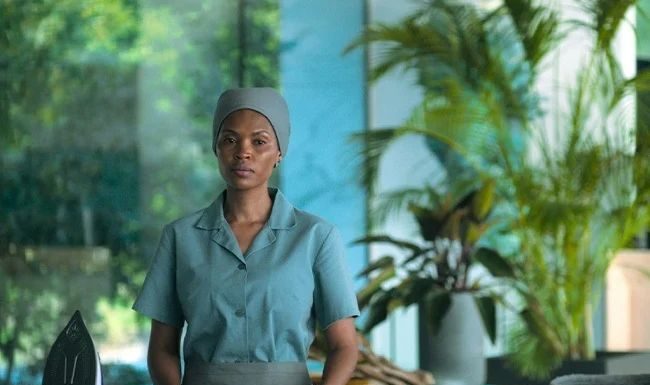South African crime thriller created by Ozgur Onurme, Zenzi Mwala (Gale Mabalane) plays the title character in Netflix‘s Unseen (2023). She looks nearly shy as she performs her duties as a housekeeper in the background. Her life is turned upside down when her husband Max (Vuyo Dabula) disappears. She is moreover fighting for her life while continually coming under attack from all directions. both in terms of monetary issues and genuine bodily dangers.
Even though Zenzi is at her limit, she never backs down or gives up, even when she has her back against the wall. She doesn’t intend to kill anyone, mind you, but they do often compel her to. She conducts a slew of murders and learns frightening details about her husband’s past while benefiting from the same societal treatment that had rendered her invisible. Despite the criminality and drama that permeates Netflix’s “Unseen,” Zenzi’s trials and tribulations often ring true. If the movie’s relatable tone has led you to ponder if it’s based on a real event, then the following information is important for you to know. Let’s find out the answer at tvacute.com
Is ‘Unseen’ On Netflix, Based on a True Story
No, the film “Unseen” is not inspired by a real-life event. Unseen is not an original idea, but rather a riff on the Turkish crime thriller Fatma (2021) which is directed by Özer Feyzioğlu and Özgür Önürme. It follows a seemingly mundane cleaning lady as she searches for her missing husband. When her efforts to discover him prove fruitless, she turns to murder, often getting away with it because of the stereotypes and assumptions people have about her. The first episode of Unseen, which is based on the Turkish series Fatma, is a near-carbon copy of Fatma’s pilot. The show’s plot also makes an effort to comment on social issues. The creator of “Unseen,” Ozgur Onurme, sheds light on the lives of those who are overlooked. Ozgur did the same thing with “Fatma,” and in “Unseen,” he develops the idea even further, albeit in a different geographical setting.
It has been two years since the release of Fatma, and we barely remember it. There is a decent tale here about a lady who seems helpless and resorts to violence as she searches for her husband, but we hope the story will develop into something fascinating from the first episode that drags a bit. Raymond accidentally showing Zenzi the safe’s combination and then leaving the door open when he leaves are examples of convenient storytelling in the pilot. Zenzi’s search for Max is tinged with obvious dread and concern. We believe that her initial murder was motivated by both fear and anger (her second). The series’ progression will reveal which way the scales ultimately tilt.
The fury stems from the fact that Esulu
(played by Omhle Tshabalala), her kid with Max, was murdered. In flashbacks, we see Max’s behavior as the cause of her son’s death, and the goon Raymond sends to employ Zenzi for a job states as much. Given that Zenzie is more often the victim than the offender, how will she handle that kind of anger?
Similarly, the interpersonal connections Zenzi develops throughout the course of ‘Unseen’ are considerably different from what we see in ‘Fatma.’
Yet what really sets
“Unseen” apart from its Turkish model is its dedication to telling a genuine South African story. Because of Netflix, the team behind “Unseen” can share their genuine, first-hand experiences with an international audience. we can fully see how it fits within South African culture. In the end,
“Unseen” is not based on a specific occurrence in actual life. The series was inspired by the Turkish drama Fatma. Like
‘Fatma,’ this show is inspired by universal experiences shared by people from all walks of life. The show’s representation of a female character and her problems are believable, and the show’s grasp of poverty is empathetic, all of which contribute to the show’s ability to tell a genuine story.







